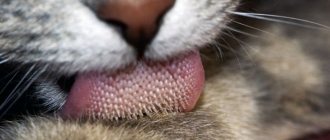Unsociability and outright fear of people on the part of homeless animals are natural and do not cause surprise. This behavior is explained by their difficult fate and the need for constant survival in harsh conditions.
With domestic cats, who have only recently begun to be afraid of everything, the situation is somewhat more complicated. In such situations, it is very important to find out the cause of the anxiety and try to eliminate it - otherwise you risk becoming the owner of a nervous and aggressive pet.
Balloon
This point also applies to sudden noise. However, the balls attract with their unusualness. Cats playfully watch them, then try to engage them in play with their paws. But then the balloon bursts.
This will serve as a lesson for the animal for the future. In the future, the cat is unlikely to want to play with suspicious objects again.
- Author: Elena Romanenko
Rate this article:
- 5
- 4
- 3
- 2
- 1
(168 votes, average: 4.2 out of 5)
Share with your friends!
What are cats afraid of?
There are a great many stories and videos on the topic “cat and vacuum cleaner”. Cats, with rare exceptions, are afraid of loud sounds from electrical appliances: electric meat grinders, vacuum cleaners, washing machines, even electric razors. The fact is that their hearing is extremely developed; animals have access to ranges that humans have never even dreamed of: in a cat the indicator fluctuates up to 65 kHz, while in humans it is only 20 kHz.
A cat can be scared of anything: a stranger, another animal. Cats are afraid of unpleasant odors, water, changes in surroundings, and sharp sounds.
Water is one of the main cat fears
Cats have individual phobias. There are two cats living in the house. The first one is not afraid of almost anything. Loves to swim and play with tangerines. Even sharp claps and shots are tolerated like a gun dog. But he is terribly afraid of mice. The second one is even afraid of his own shadow, but he catches rats perfectly.
How is fear expressed?
The set of external manifestations of fear is standard: the cat presses its ears and tail, meows, tries to run away from the irritant and hide.
It’s worse when fear causes an attack of aggression in the animal: the cat arches its back, hisses, and whips its tail on the sides. In a second, the fluffy ball turns into an evil monster. In these cases, the owner needs to be careful and attentive. Despite its small size, a cat can cause serious injuries with its claws and teeth.
There is no more dangerous animal than a scaredy cat
Getting rid of fears
Showing anger and aggression in cats is the first reaction to fear. The behavior of the owners should depend on how the frightened cat behaves.
Precautionary measures:
- First of all, protect yourself if you feel that your cat’s aggression is directed at you.
- A spray bottle of water helps as a “sedative.” When living together with a cat, this is a very effective means both for self-defense from an animal that is ready to attack, and for distracting the cat himself from fear and anger to a more pressing problem - licking his loved one.
My eight-kilogram Persian cat did not tolerate brushing. He scratched, bit and squirmed so much that it was very difficult to hold him. We had to take precautions: put on an oilcloth apron and wrap our hands in two terry towels to avoid injury.
If you need to move a frightened cat to another room, play it safe. Canvas tops will come in handy. As a measure of short-term submission, a blanket thrown over a cat is suitable.
The cat needs shelter
There are several ways to help your cat cope with fear:
- Retreating is an effective way to calm a frightened cat and calm an aggressive cat. By retreating a few steps, do not deprive the cat of the opportunity to retreat on her own. Remove from the room the irritant that caused her violent reaction - a stranger or another animal.
- If you do not feel a direct threat from a frightened cat, sit down or lie down on the floor. She will feel more confident “on equal terms.” And don't look the beast in the eye.
- Stop paying attention, ignore. Relax and look away. Talk in a low voice to yourself or to someone nearby. Sing something gently. This way the cat will understand that she is not in danger.
- And of course, a furry pet should always have its own hiding place, where it can feel safe and calm.
Provide your cat with a place where he feels safe
- When the cat has stopped showing signs of aggression and fear, approach it with a treat, but do not touch it. Let the animal decide for itself whether to approach you or not.
How not to behave with a scared cat
Under no circumstances should you anger or frighten a cat on purpose! It must be funny to watch how a frightened, roaring animal with flattened ears brushes off the offender with its paw. But this may end with the cat deciding: the best defense is an attack. In this case, it won't be surprising if he attacks when you don't expect it.
It is strictly forbidden to hit a cat or shout at it. Firstly, it makes no sense: cats do not know the feeling of guilt, and they do not perceive the word “impossible”. Secondly, the owner risks making a mortal enemy instead of the affectionate purr.
Be careful with an angry cat
Wild and domesticated cats
Usually, when talking about wild cats, we mean animals born on the street. The four-legged animals stay in the nest for up to 1.5–2 months and do not see people or other animals. Afterwards they explore the world under the strict control of their mother. Naturally, the “two-legged giant” seems like a threat to the little kitten. The reaction is quite predictable - run for cover, and if caught, then scratch, hiss, bite and call for the mother.
Important! Even a 1-2 month old wild kitten is capable of causing serious scratches and bites, and if the mother comes to the cry of the baby, you will have a very hard time. Not only will the mother cat attack, but she will also chase you until you leave her territory.
Tamed cats are animals that lived in human company for some time, but suddenly began to be afraid of people. In addition to bites and scratches, you can receive gifts from a frightened animal in the form of piles and puddles, torn wallpaper or torn curtains. It is more difficult to correct the behavior of a domestic cat than a wild one. A kitten on the street can be accustomed to itself gradually, because the main reason for fear is mistrust. The domestic cat already knows people, but harbors a grudge (fear).
Important! Overly aggressive behavior also indicates fear, but the reason may not lie in fear of people.
We provide a positive experience
Cats feel better when they have positive experiences. Offer your pet treats and toys to alleviate fear.
Encourage interaction with toys. A long feather wand is ideal because your cat can play with you while maintaining a safe distance.
If your cat is very timid, place a treat near your cat and move away. Over time, slowly move closer or stay longer each time you do this and speak in a soft, encouraging tone.
If you are patient, you can get your pet to take the treat from your hand.
Some cats may only show fear in certain situations, such as when a stranger appears in the house. Whenever someone comes over, give your cat a treat.
These situations will require more time. You can enlist the help of friends or family members who come regularly.
What smells do cats dislike the most?
A cat is an amazing animal, whose organs of vision and smell allow them to perfectly navigate in space, communicate and mark their habitat. These predators perceive two types of odors: pleasant and repellent.
The first ones calm the animal (the smell of the owner’s sweat) or, on the contrary, excite it (valerian, catnip). And the latter are unpleasant because they have a high odor intensity.
You can use unpleasant odors to correct the behavior of mustachioed pets in a number of cases: the animal damages furniture, curtains, indoor plants and wallpaper, marks, leaving a sharp unpleasant odor that cannot be removed by anything, and shits in the wrong litter box.
What smells do cats not like?
Natural repellents include a large number of products that are on hand. The stronger the aroma, the more the cat dislikes it:
- seasonings and spices (cloves, thyme, rosemary, cinnamon, ginger, bergamot, black pepper, cayenne pepper);
- different types of citrus fruits (orange, lemon, grapefruit, tangerine);
- vegetables with a strong smell (onions, garlic);
- table vinegar , diluted in water in proportions 1:1;
- essential oils (citrus, lavender, rosemary, rue, lemongrass, mustard, pennyroyal, tea tree).
Citrus
The citrus repellent method is very simple to use. Orange peels (or peels of other citrus fruits) must be placed in the cat’s “favorite” places - recesses in furniture, the space behind the chest of drawers or flower pots.
Sometimes fruit peels have varying degrees of effects on your pet. Their repellent effect can only be determined experimentally - alternate fruit peels, thereby determining which smell will be more unpleasant to the cat.
Reference! A furniture polish with a citrus scent may come in handy around the house.
Essential oils
Most essential oils have a strong, spicy aroma that cats cannot tolerate. Therefore, almost all essential oils can be used as a repeller. One of the most effective is rosemary oil.
Important! You need to use essential oil very carefully, as it can cause allergies in your pet.
A few drops of oil are added to a liter of water, mixed thoroughly (since water and oil are two immiscible liquids) and sprayed onto the affected areas of the pet.
Important! Valerian essential oil is one of the cat's favorite scents and has no repellent effect.
Onions and garlic
Every housewife has a head of onion or garlic in her supplies. These two vegetables are among the favorite natural cat repellers. Onions and garlic contain organic sulfur compounds, which give them such an unpleasant odor.
It is necessary to grate a head of onion or garlic and place it (for example, in saucers) next to indoor plants, near a country house, in flower beds or furrows of a garden bed. It should be noted that the smell of onions and garlic is unpleasant not only for cats, but also for people.
Seasonings and spices
The most effective, but more dangerous method of repelling with pepper.
It is best to take peppercorns and crush them yourself. Next, pour the pepper mass with a glass of warm water and boil. After cooling, pour the liquid into a spray bottle, shake and spray on areas undesirable for your pet.
Important! The method is dangerous because it can injure the animal, cause an allergic reaction and irritation of the mucous membranes of the eyes, nose and mouth.
Dried lavender
One of the most unpleasant smells for a cat is lavender. It is necessary to take dried inflorescences, as they have a sharper smell and take longer to dissipate compared to fresh flowers.
You can use inflorescences of herbs and plants such as thyme, rosemary, cloves, and ginger. It is enough to dry the flowers and place them in places where your pet is mischievous.
Vinegar
Vinegar has such a pungent and unpleasant odor that it eliminates the smell of urine in the area marked by the cat. Therefore, this method has found wide application. A solution of vinegar essence or vinegar with water is prepared in a 1:1 ratio. It can be used to wash wooden, tiled and concrete surfaces. The main thing to remember is that our pets are more sensitive to the properties of caustic substances.
Perfumes and alcohol
The smell of alcohol, like other repellents, has an unpleasant odor for cats. With its help, you can wean your pet from walking on tables and “shitting” in undesirable places. For example, you can leave a saucer with any strong alcohol or ethyl alcohol on the table surface. You can also spray the liquid on certain areas. Alcohol evaporates quickly, so re-processing is possible.
The aroma of not only perfume (especially strong odors), but also various deodorants scares away cats. Sometimes a pet may have a dislike for a certain person because of their cologne, antiperspirant or eau de toilette.
When using perfume as a deterrent, it is better to choose citrus, menthol, lavender and pine scents. To do this, you need to soak a napkin or cotton pad with the product and place it on your pet’s “favorite” place.
What should the owner do?
It is important to understand one thing - a defensive cat can seriously injure you and even cripple you. At the moment of immediate fright, it is better to leave her alone, giving her the opportunity to come to her senses. After this, you should start looking for the irritating factor and eliminating it.
Correct behavior of all family members
If you do not live alone, gather a family council. Their effectiveness will depend on the coherence of your actions. How to solve the problem depends on the situation:
- Negative memories.
Surround your pet with attention and care. Over time, he will understand that nothing threatens him in your home.
- Stress.
Choose a more comfortable carrier for visiting the veterinarian or help your kitten adapt to unfamiliar conditions.
- Fright.
Give your pet a private corner where he can hide and be alone. In addition to the house, it can be a high play complex with an observation deck at the very top (an example of a homemade house).
If you suspect an illness, contact your veterinarian immediately. Be sure to list all symptoms detected at your appointment. They will help identify the location and extent of the damage.
Should I give my cat a sedative?
Anti-anxiety medications are effective during moving and other stressful situations that cannot be eliminated. They should only be given as directed by a veterinarian. The only exception is a special diffuser with cat pheromones. It acts directly on the neurons of the brain and is not addictive.
IMPORTANT!
Do not use valerian to calm your cat. Its prolonged use is fraught with behavioral disorders and the development of drug addiction.
What not to do
Animals' fears are most often associated with negative experiences and mistakes made by their owners when raising them. The most common of them include the following:
- Punishment or reward for being scared. Both actions only exacerbate existing fear.
- Refusal to regularly visit the veterinary clinic. Periodic inspections should be routine, not a surprise.
- Too intrusive communication. Fear of people is not always associated with rough treatment. An animal may avoid its owner due to constant compulsion to play against its will.
It is also important to note that pets should never be intentionally frightened. Such actions may lead to loss of trust.
Main causes of fear
The character of cats is not as flexible as, for example, dogs. In addition, these animals are not so successful in training, and few people manage to teach them complex tricks. Experienced cat owners believe that if a pet experiences fear of humans, this can lead to serious consequences. There is a completely logical explanation for this - even small mustachioed striped animals are, in fact, predators, and at the genetic level they are accustomed to attacking a frightening subject, rather than fleeing.
Among the main reasons for cats' fear of people are:
- Human rudeness towards animals, physical torture, deliberate intimidation.
- Previous negative experience of communication between an animal and people, because we must not forget about the excellent memory of cats.
- Infringement of rights to territory.
- Lack of self-confidence.
- Incomplete or impaired socialization.
Excessive fearfulness of a pet usually worries the owner, but most conditions can be corrected. The main thing is to find out why the animal is afraid of people.
Rating of cat repellent sprays
Spray name
Spray 8 in 1 “Nature's Miracle”
Eliminating odors of marks and urine in the toilet, deterring further mischief
Spray 8 in 1 “Nature's Miracle”
The spray contains essential oils of lemon and thyme - repellent components. Designed for cleaning surfaces damaged by pets. Wet the area to be treated generously and leave for 10 minutes, then remove the moisture with a napkin. Good for removing stains. Effective for scaring away and weaning cats from shitting. But the spray must be used in the absence of children and people with hypersensitivity to odors.
Doctor Vic
Repellent based on essential oil of rue tree to correct the behavior of a pet. Apply to the surface of furniture, floors, flower pots at a distance of approximately 30 cm. Treatment is carried out once a day until the cat stops approaching the treated area. Effective in repelling cats, but may cause an allergic reaction in humans.
Important! Do not spray directly onto houseplants, flowers or soil.
Beaphar “Stop – it Cat”
The main active ingredient is methylnonyl ketone. Apply to objects, furniture and floors once a day until the cat’s bad habit is completely eliminated. Preferably used for adult cats. Effective in combination with an attractive spray.
Biovax “Scare away? Yes!"
Contains essential oils of tea tree and cinnamon. Designed to protect furniture, wallpaper, floors. The surface is treated once a day at a distance of 20 cm. It is effective only for scaring away kittens. Adult animals do not react at all.
Important! Do not apply to animals or plants! May cause allergic reactions in humans.
Faithful friend 4 in 1
The spray contains essential oils of lavender and tea tree, which is the main deterrent component of the product. It is designed to protect furniture, walls, and floors from being scratched and marked by a pet. Spray over the surface at a distance of 25 cm. Apply 1-2 times a day. It has a pleasant aroma that does not irritate human mucous membranes. Has no visible effect of repelling unneutered cats.
Why did the animal suddenly become afraid of everything?
The main reasons for sudden changes in behavior include nervous shocks and various pathologies affecting the central nervous system. In the first case, the problem is solved by creating a safe and comfortable environment, and in the second, by drug treatment under the supervision of a veterinarian.
Negative memories
If you got your pet from other owners or were picked up on the street, then you can only guess about its past. If there are negative memories of a certain event, fear will be activated by a specific trigger: children, dogs, a wave of the hand, or seemingly harmless things.
Initially, a domestic cat may be frightened by shouting too loudly, unfair punishment, or accidentally stepping on its tail or paw. Despite the absence of malicious intent on your part, such events must be smoothed out. Otherwise, the animal will begin to avoid you and hide in secluded places.
IMPORTANT!
Don't let your pet go out alone if you can't guarantee its safety.
Experienced stress
Most mustachioed pets are terrible conservatives. Any change in their usual lifestyle puts them in a state of stress. It is especially difficult for cats to move, meet new family members, change owners, and receive treatment.
Stress can be short-term or chronic. In the first case, the animal copes with the experiences on its own after a couple of hours or a day, and in the second, it is in dire need of outside help. Chronic stress is provoked by frequent encounters with irritating factors, as well as prolonged exposure to unfavorable conditions.
Great fright
Another possible reason is severe fear. Cats are sensitive to sharp and loud sounds, so many of them cannot stand a vacuum cleaner, hair dryer and other household appliances.
The effect of surprise plays a significant role. Some owners calm their pets during heat by dipping them in cold water. This method really works, but it also creates a new phobia due to its inadequacy and increases the chances of getting a genital tract infection.
NOTE!
The only humane and really working way to eliminate sexual desire is castration.
Neurological diseases
Mental disorders occur not only in people, but also in their pets. Based on their occurrence, they are divided into congenital and acquired. Sudden attacks of fear and increased anxiety are associated precisely with the latter.
If your pet is over 12 years old or has recently suffered a skull or spinal injury, contact your veterinarian. The resulting deviation may be associated with a stroke or epilepsy. If the pathology is confirmed, the animal will require special care and home treatment.
Smells
In addition to hearing, cats have a very highly developed sense of smell. Cats smell much more strongly than humans.
Therefore, strong and pungent odors can irritate the cat's receptors. This reaction in cats is at the level of instincts.
It is not for nothing that there are stories where a cat helped its owner avoid trouble. The animal raised the alarm and woke up its owner because it detected a slight smell of ash and smoke.
It is worth paying attention if a cat cleans and rubs its nose with its paw, then perhaps it smells a foreign odor. Smells that irritate cats can come from the following things:
- -oranges, lemons, tangerines—cats cannot stand the smell of citrus fruits
- -shampoos, deodorants, eau de toilette
- -glue, paint, varnish
- -vinegar, alcohol, medicines
How to get a cat out of the attic?
First: plant catnip in one place on the plot. They love this plant very much and will only come to the place where it grows. The other method, on the contrary, is deterrent. Cats
They really don’t like the smell of eucalite, lavender and lemongrass.
Interesting materials:
Why are Gaming Chairs Expensive? Why turkey and not turkey? Why is turkey Turkey? Why is turkey called that? Why does the sound on my TV sometimes disappear? Why is the grinder tool called a grinder? Why did Lady's slipper disappear? Why did the sound disappear? Why are pigeons used for mail? Why doesn't YouTube upload videos?
Patience and more patience
Getting fearful cats to stop being afraid takes time. Be patient and don't force your cat to do anything. This means that you should not wear it or place it anywhere in the house against your will. This will only increase the fearful behavior.
Let the cat come on its own. You can encourage interaction by speaking softly and offering a positive experience, but don't push it.
If there is a person in the house whom the cat is afraid of, let him feed the cat. Over time, she will understand that people are not a threat.
Water
Almost every cat's eyes become huge and pitiful at the moment when he realizes that he is in danger of bathing.
This reaction of cats is explained by their nature. As is known, their undercoat, which creates an air cushion, plays a large role in the thermoregulation of the animal. Thanks to it, cats can tolerate both heat and cold well. This is especially true for those who live on the street and can only dream of the comforts of home.
But if the cat gets wet, then its natural protection disappears. This can lead to illness or, in the worst case, disastrous consequences. For this reason, cats do not like to bathe, although they can swim well. As soon as their undercoat gets wet, they immediately shake themselves off and try to crawl out of it in order to dry as quickly as possible and protect themselves.
In addition, the animal’s subconscious tells it that the smell emanating from wet fur can scare away prey. And the animal itself is exposed to becoming a victim of stronger and more agile hunters.
In addition, wet fur gets dirty and tangled very quickly, which is not particularly appealing to clean cats.
How to help a cat cope with its fears?
At first glance, it may seem that such an independent animal as a cat is not capable of experiencing fear. They fearlessly climb trees, walk along the very edge of the roof of a multi-story building and with an arrogant look tease dogs that surpass them not only in size, but also in physical strength. However, despite all these facts, furry pets are quite shy and have their own specific phobias. So, let's figure out what cats are afraid of.











